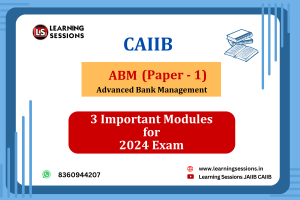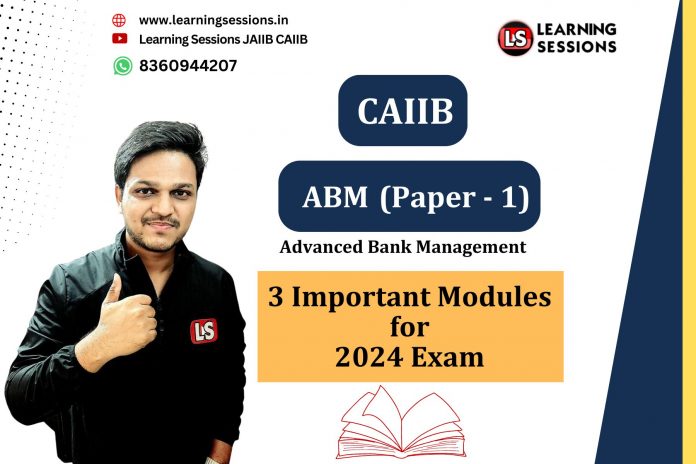Are you aspiring for IIBF CAIIB certification in 2024? The CAIIB exam season 2024 is approaching. Candidates need to begin preparing for the CAIIB ABM now. The CAIIB ABM paper 1 is going to be conducted on 7th July 2024 and starting preparations early ensures candidates cover the syllabus thoroughly and increase their chances of success in the CAIIB ABM paper.

📚 CAIIB Study Resources 📚
👉 Check Here
👉 Check Here
👉 Check Here
👉 Get Tests Here
👉 Check Here
👉 Click Here
👉 Click Here
CAIIB Syllabus: CAIIB Compulsory Subjects-
Paper 1: Advanced Bank Management (ABM)
Paper 2: Bank Financial Management (BFM)
Paper 3: Advanced Business and Financial Management (ABFM)
Paper 4: Banking Regulations and Business Laws (BRBL)
CAIIB Advanced Bank Management (ABM) Paper Pattern
Number of questions -100
Marks – 100
Duration – 2 hours
CAIIB Advanced Bank Management (ABM) Paper exam dates 2024
IIBF is going to conduct CAIIB ABM paper-1 on-
- 07th July 2024 and
- 24th November 2024
3 Most Important Modules of ABM
Module – A
- Number of questions -100
- Marks – 100
- Duration – 2 hours
CAIIB ABM – Module A Important Topics
- Statistics
- Sampling Techniques
- Theory of Probability
- Estimation
- Linear Programming
- Simulation
Note – Module A is the most important and scoring module of CAIIB ABM. Candidates are suggested not to skip any topic of the module.
CAIIB ABM Module- A Syllabus
|
Chapter |
Topics |
|
Definition of Statistics, Importance & Limitations & Data Collection, Classification & Tabulation |
Importance of Statistics; Functions of Statistics; Limitation or Demerits of Statistics; Definitions; Collection of Data; Classification and Tabulation; Frequency Distribution. |
|
Sampling Techniques |
Random Sampling; Sampling Distributions; Sampling from Normal Populations; Sampling from Non-Normal Populations; Central Limit Theorem; Finite Population Multiplier. |
|
Measures of Central Tendency & Dispersion, Skewness, Kurtosis |
Arithmetic Mean; Combined Arithmetic Mean; Geometric Mean; Harmonic Mean; Median and Quartiles; Mode; Introduction to Measures of Dispersion; Range and Coefficient of Range; Quartile Deviation and Coefficient of Quartile Deviation; Standard Deviation and Coefficient of Variation; Skewness and Kurtosis. |
|
Correlation and Regression |
Scatter Diagrams; Correlation; Regression; Standard Error of Estimate |
|
Time Series |
Variations in Time Series; Trend Analysis; Cyclical Variation; Seasonal Variation; Irregular Variation; Forecasting Techniques |
|
Theory of Probability |
Mathematical Definition of Probability; Conditional Probability; Random Variable; Probability Distribution of Random Variable; Expectation and Standard Deviation; Binomial Distribution; Poisson Distribution; Normal Distribution; Credit Risk; Value at Risk; Option Valuation |
|
Estimation |
Estimates; Estimator and Estimates; Point Estimates; Interval Estimates; Interval Estimates and Confidence Intervals; Interval Estimates of the Mean from Large Samples; Interval Estimates of the Proportion from Large Samples. |
|
Linear Programming |
Graphic Approach; Simplex Method |
|
Simulation |
Simulation Exercise; Simulation Methodology |
Tips for CAIIB ABM Module- A
- Don’t skip any topic.
- Practice mock tests and previous year’s questions for the numerical section.
Module – B
CAIIB Advanced Bank Management (ABM) Paper Pattern
- Number of questions -100
- Marks – 100
- Duration – 2 hours
CAIIB Module- B important chapters
Cover chapters from 10 to 16
CAIIB ABM Module – B Syllabus
|
Chapter |
Topics |
|
Fundamentals of Human Resource Management |
The Perspective; Relationship between HRM & HRD and their Structure and Functions; Role of HR Professionals; Strategic HRM; Development of HR Functions in India |
|
Development of Human Resources |
HRD and its Subsystems; Learning and Development – Role and Impact of Learning; Attitude Development; Career Path Planning; Self-Development; Talent Management; Succession Planning |
|
Human Implications of Organisations |
Human Behaviour and Individual Differences; Employees Behaviour at Work; Diversity at Workplace and Gender Issues; Theories of Motivation and their Practical Implications; ‘Role’: Its Concept & Analysis |
|
Employees’ Feedback and Reward System |
Employees’ Feedback; Reward and Compensation System |
|
Performance Management |
Appraisal Systems; Performance Review and Feedback; Counselling; Competency Mapping and Assessment of Competencies; Assessment Centres; Behavioural Event Interview (BEI) |
|
Conflict Management and Negotiation |
Conflict: Concept & Definition; Characteristics of Conflict; Types of Conflicts; Reasons for Conflict; Different Phases of Conflict; Conflict Resolution; Conflict Management; Negotiation Skills for Resolution of Conflicts |
|
HRM and Information Technology |
Role of Information Technology in HRM; HR Information and Database Management; Human Resource Information System (HRIS); Human Resource Management System (HRMS); e–HRM; HR Research; Knowledge Management; Technology in Training; HR Analytics. |
Module C
CAIIB Advanced Bank Management (ABM) Paper Pattern
- Number of questions -100
- Marks – 100
- Duration – 2 hours
CAIIB Module C important chapters
- Credit Management
- Analysis of Financial Statements
- Working Capital Finance
- Term Loans
- Credit Control and Monitoring
- Risk Management and Credit Rating
- Rehabilitation and Recovery etc.
CAIIB ABM Module-C Syllabus
| Chapter |
Topics |
|
Overview of Credit Management |
Importance of Credit; Historical Background of Credit in India; Principles of Credit; Types of Borrowers; Types of Credit; Components of Credit Management; Role of RBI Guidelines in Bank’s Credit Management. |
|
Analysis of Financial Statements |
Which are the Financial Statements; Users of Financial Statements; Basic Concepts Used in Preparation of Financial Statements; Accounting Standards (AS); Legal Position Regarding Financial Statements; Balance Sheet; Profit and Loss Account; Cash Flow Statement; Funds Flow Statement; Projected Financial Statements; Purpose of Analysis of Financial Statements by Bankers; Rearranging the Financial Statements for Analysis; Techniques used in Analysis of Financial Statements; Creative Accounting; Related Party Transactions. |
|
Working Capital Finance |
Concept of Working Capital; Working Capital Cycle; Importance of Liquidity Ratios; Methods of Assessment of Bank Finance; Working Capital Finance to Information Technology and Software Industry; Bills/Receivables Finance by the Banks; Guidelines of RBI for Discounting/Rediscounting of Bills by Banks; Trade Receivables Discounting System (TReDS); Non-Fund Based Working Capital Limits; Other Issues Related to Working Capital Finance. |
|
Term Loans |
Important Points about Term Loans; Deferred Payment Guarantees (DPGs); Difference between Term Loan Appraisal and Project Appraisal; Project Appraisal; Appraisal and Financing of Infrastructure Projects. |
|
Credit Delivery and Straight Through Processing |
Documentation; Third-Party Guarantees; Charge over Securities; Possession of Security; Disbursal of Loans; Lending under Consortium/Multiple Banking Arrangements; Syndication of Loans; Straight Through Loan Processing or Credit Underwriting Engines. |
|
Credit Control and Monitoring |
Importance and Purpose; Available Tools for Credit Monitoring/Loan Review Mechanism (LRM). |
|
Risk Management and Credit Rating |
Meaning of Credit Risk; Factors Affecting Credit Risk; Steps taken to Mitigate Credit Risks; Credit Ratings; Internal and External Ratings; Methodology of Credit Rating; Use of Credit Derivatives for Risk Management; RBI guidelines on Credit Risk Management; Credit Information System. |
|
Restructuring/Rehabilitation and Recovery |
Credit Default/Stressed Assets/NPAs; Wilful Defaulters; Non-cooperative borrowers; Options Available to Banks for Stressed Assets; RBI Guidelines on Restructuring of Advances by Banks; Available Frameworks for Restructuring of Assets; Sale of Financial Assets. |
|
Resolution of Stressed Assets under Insolvency and Bankruptcy Code 2016 |
Definition of Insolvency and Bankruptcy; To Whom the Code is Applicable; Legal Elements of the Code; Paradigm Shift; Corporate Insolvency Resolution Process; Liquidation process; Pre-packed Insolvency Resolution Process for stressed MSME. |
CAIIB CAIIB ABM Syllabus Priority
Check our CAIIB ABM syllabus priority video prepared by our CAIIB exam expert (having 7 years of experience as a banker) and cover the syllabus in 22 hours.
Create a Study Plan
CAIIB candidates are bankers, and they have a busy schedule So it is very important for candidates to create their study plan and divide topics of each module in a way that they cover the syllabus timely and have sufficient time for revision.
Prepare with Quality Study Materials
Quality study material helps candidates with a clear and comprehensive understanding of topics and concepts especially when there is a numerical section in the syllabus, it is recommended to rely on good study material. So, for easy comprehension of the syllabus and for better results it is important to choose the best study material.
Practise Mock Tests and Previous Year’s Questions
Appearing in the CAIIB exam without practising the previous year’s questions and mock tests is the formula to scoring fewer marks or sometimes not clearing the exam. To know the CAIIB ABM paper difficulty level, effective time management and to increase confidence level, practising mock tests and previous year’s questions are highly recommended.
Time Management
To avoid wasting time in the exam, time management during CAIIB exam preparation helps in staying focused and organised in the examination. Allot more time for important and difficult modules/topics to acquire a comprehensive understanding.
Seek Clarification and Guidance
Taking Expert guidance in CAIIB exam preparation is the right approach. Learning Sessions has more than 7 years of experience in the CAIIB exam preparation and can significantly enhance your chances of success. So for the CAIIB upcoming exam, it is advisable to seek guidance from our experts.
Don’t Stress out
Candidates need to stay calm on the exam day. Carefully read the instructions and attempt easy questions first. There is no negative marking for incorrect answers so it is recommended to attempt all questions.
CAIIB ABM Study Material 2024
CAIIB ABM Study Material: Video Questions
CAIIB Video Courses provided by us are available in two languages – bilingual (English mix Hindi) & English. The video course is prepared in a chapter-wise format for the ease of the candidates.
CAIIB ABM Study Material: EPDFs
EPDFs are sources for the revision of any syllabus after the candidates have watched the ABM video lectures. CAIIB ABM EPDFs provided by learning sessions are available on our Android application.
CAIIB ABM Study Material: Previous Year Question Papers
CAIIB ABM Study Material: Mock Tests
Access your performance and weak and strong areas by practising our CAIIB ABM Mock Tests. Mock tests help candidates in Practice, Time Management, and experience the real exam.
Features of our Study Material
- ABM latest study material.
- ABM Video Classes
- Live Video and Recorded Video Classes
- Access through Web browsers & Mobile applications.
- Mock Tests of all the subjects of CAIIB 2024.
- CAIIB Case Studies are also covered in the lectures.
- Videos are covered in Hindi mix English or English only.
- Epdf notes of CAIIB papers.
- Memory Recall Questions of CAIIB previous Exams are also covered.
Get Free ABM Mock Tests
So, this article has made it easier for candidates to prepare for the CAIIB BFM paper. Without wasting time, start preparing for the paper now. In your CAIIB certification journey, Learning Sessions are always there to support you. For any support and guidance, send us your query on WhatsApp. Our experts are always ready to help you in achieving success in the CAIIB exam.
Also Like:





